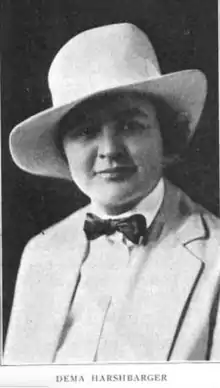Dema Harshbarger
Dema Harshbarger (September 8, 1884 — February 20, 1964) was an American businesswoman, concert promoter, and talent manager.

Early life
Dema E. Harshbarger was born in Knox, Illinois, one of the seven children of Richard Henry Harshbarger and Sarah Belle Lewis Harshbarger.[1] She survived polio and rheumatic fever in her youth.[2] She attended Knox College.[3] Soon after college, she went traveling with her music teacher Mrs. Parry; the two were among the rescued passengers in the wreck of the RMS Slavonia off the coast of Portugal.[4]
Career
Harshbarger started her career at the Century Lyceum Bureau in Chicago, booking lecturers and entertainers in small towns in Illinois and Indiana.[5]
From 1919 to 1921 she and Jessie B. Hall ran the Fine Arts Bureau in Chicago.[6][7] In 1921 she left Hall to become co-owner of Harrison and Harshbarger, a Chicago concert booking agency.[8] Their first exclusive client was tenor Charles Marshall,[9] and they helped to develop the "Organized-Audience Plan", a subscription model for entertainment bookings in smaller cities.[10] In the 1920s, Harshbarger was co-founder (with Ward French) and president of the National Civic Music Association.[11][12] "Through her service," explained a California newspaper in 1932, "more than one and a half million people in the forty-eight states are served with musical attractions."[13]
Harshbarger sold her agency to NBC,[14] moved to California, and was made head of the network's Artists' Bureau in 1936. She became manager and press agent of Hedda Hopper,[15] and was frequently mentioned in Hopper's gossip column.[16][17]
Personal life
Dema Harshbarger was a lesbian.[18][19] She was known for wearing tailored suits, bowties, and hats.[20] She lived in La Habra Heights, California, where she raised avocados.[21] She died in 1964, aged 79, in Los Angeles, California.[2]
In popular culture
Dema Harshbarger was played by Joyce Van Patten in the 1985 television film about Hedda Hopper and Louella Parsons, Malice in Wonderland.
References
- Dema E. Harshbarger, "My Own Story" Green Book Magazine (October 1919): 20-22.
- Hedda Hopper, "There'll Never Be Another" Los Angeles Times (February 24, 1964): 62. via Newspapers.com

- The Arrow of Pi Beta Phi (1908): 399.
- "Our Young People: Shipwrecked but Saved" The Herald of Gospel Liberty (February 8, 1910): 146.
- "She Made $75 Her First Week in Booking Field" Lyceum Magazine (November 1919): 26.
- "Fine Arts Bureau Expands" Lyceum Magazine (September 1919): 43.
- "Bureau of Fine Arts" Music News (January 28, 1921): 8.
- "New Chicago Firm Books Fifty Concerts for Marshall" Musical America (April 2, 1921): 30.
- "Harrison and Harshbarger" Music News (March 4, 1921): 12.
- James M. Doering, The Great Orchestrator: Arthur Judson and American Arts Management (University of Illinois Press 2013): 78. ISBN 9780252094590
- Christopher Sampson, "Applauding a Movement: Eighty Years of Civic Music" Brown County Civic Music Association.
- "Association Brings Noted Artists Here" Battle Creek Enquirer (January 1, 1925): 98. via Newspapers.com

- "Founder of Civic Music Service is to Visit Modesto" Modesto News Herald (March 2, 1932): 5. via Newspapers.com

- "Stars are Not Self-Made; Credit Goes to the Audience" Nevada State Journal (March 15, 1938): 7. via Newspapers.com

- "How Hedda Hopper Became a Columnist" Chicago Tribune (September 26, 1952): 22. via Newspapers.com

- Hedda Hopper, From Under My Hat (Graymalkin Media 2017). ISBN 9781631681189
- "Cinema: The Gossipist" Time (July 28, 1947).
- William J. Mann, Behind the Screen: How Gays and Lesbians Shaped Hollywood, 1910-1969 (Viking 2001): 153-154. ISBN 9780670030170
- Gregory Woods, Homintern: How Gay Culture Liberated the Modern World (Yale University Press 2017). ISBN 9780300234992
- William J. Mann, How to Be a Movie Star: Elizabeth Taylor in Hollywood (Houghton Mifflin Harcourt 2009): 55. ISBN 9780547417745
- Diana Wedner, "Realm of Creatures, Comforts" Los Angeles Times (November 25, 2007).